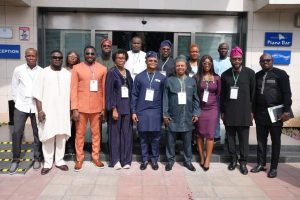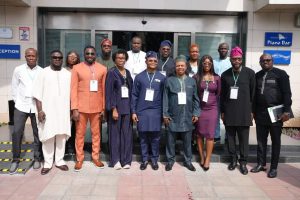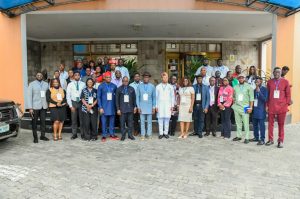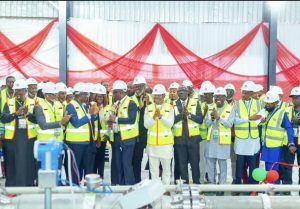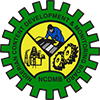—- categorizes noncompliance of Nigerian Content
In a bid to drive compliance and enforcement of the provisions of the Nigerian Oil and Gas Industry Content Development (NOGICD) Act, the Nigerian Content Development and Monitoring Board (NCDMB) has held a workshop for law enforcement agencies, with the theme “understanding the objectives and philosophy of the Nigerian Oil and Gas Industry Content Development Act.
The two-day workshop was held this week in Abuja, and it was attended by personnel from the Economic and Financial Crimes Commission, (EFCC), Independent Corrupt Practices Commission (ICPC), Nigeria Police, Nigerian Customs Service and other relevant agencies.
In his welcome address, the Executive Secretary of NCDMB, Engr. Simbi Kesiye Wabote explained that the Board organised the workshop to create synergy and collaboration with regulatory and enforcement agencies in the discharge of its mandate.
He indicated that the Board held these types of workshops regularly with a view to strengthen collaboration with key stakeholders, particularly those that are not familiar with the Board’s roles in the oil and gas industry.
The former Inspector General of Police, Dr Solomon Arase made a presentation at the workshop and identified gaps in the provisions of the NOGICD Act that would hamper the successful prosecution and conviction of companies deemed to have breached the provisions of the Act.
He proposed some amendment to the Act, notably, explicit definition of offences, expansion of the parties to offences and stiffer punishments for noncompliance.
The former IGP also advised the Board to build a small team of experts, with competences in investigation and identification of ingredients critical for proving cases of noncompliance. He suggested that the team should include officers of the Nigeria Police, ICPC, EFCC and other relevant agencies, who would be trained on Nigerian Content.
The Director, Legal Services, Barrister Umar Mohammed Babangida presented the draft Nigerian Oil and Gas Industry Content Development Compliance and Enforcement Regulation 2020 and added that the document was designed to plug some of the gaps that were identified in the NOGICD Act.
He also explained that non-compliance and breach of Nigerian Content guidelines have been categorized into Minor Infraction and Serious Infractions.
Minor offences refer to first time defaults, deficits in meeting deadlines for periodic reports and similar defaults and applicable sanctions would include Letter of Warning, Invitation of Management Team of the Operator/ stakeholder for corrective dialogue with the Board.
On the other hand, serious infraction includes repeated or persistent defaults; and/or deliberate refusal to comply with directives issued by the Board.
Punishment for such offences will include “Name and shame of defaulting Operator/stakeholder with publicity within national and international Oil and Gas communities; Notification to other MDAs about the non-compliance of the Operator/stakeholder, including request for the withdrawal of tax privileges, and/or preventing the Operator/stakeholder from getting “cost recovery”, where applicable; Withdrawal of Certificate of Authorization issued for the project under Section 8 of the Act; Withdrawal of any approval given by the Board as required under the provisions of Sections 17, 19 and 20 of the Act on Nigerian Content Compliance Certificate and Prosecution of the offenders in accordance with the provisions of part I of the draft regulation ( as a last resort.”
Explaining further, the Director said the Board shall first give notice in writing to any operator or other stakeholder, specifying the identified default(s) and corrective step, action and/or remediation required to address an identified non-compliance.
He added that failure to comply shall attract the imposition of appropriate sanctions and/or penalties as may be deemed applicable in the circumstances.
Also speaking, the Director, Monitoring and Evaluation, NCDMB, Mr. Akintunde Adelana explained that the pioneer promoters of the NOGICD Act focused on building consensus and collaboration with stakeholders, especially the international oil companies who were the drivers of the business. “We needed to focus on value addition and domiciliation. The issue of securing conviction against noncompliance was not the priority at that time.”
He listed some challenges faced by the Board in implementing enforcing the NOGICD Act to include inadequate strategic collaboration among stakeholders in the industry; overlapping of tasks by various government agencies, non-submission/late submission of statutory reports and inadequate coverage of the projects and activities in the Nigerian oil and gas industry as a result of manpower shortage.
Other challenges include execution of projects, contracts/services without approval from the Board and non-execution of NCDMB HCDI Training on the back of projects; non-deduction and remittance of NCDF one percent; utilization of non-registered vendors in the NOGICJQ, deployment of expatriates without approval from NCDMB; use of Manpower License designated for Nigerian personnel only to deploy Expatriates; refusal to Nigerianise expatriate positions after statutory four years as captured in the Act and non-submission of Research and Development Plan by Service Companies.
In his presentation, the Director, Planning Research & Statistics, Mr. Daziba Patrick Obah proposed that the Nigeria Immigration Service (NIS) and Nigerian Civil Aviation Authority (NCAA) should enforce the guidelines of NCDMB on expatriate utilization by oil & gas companies on land and offshore locations. “Enforcement and checks can be conducted at various entry points and access points to offshore locations by demanding for biometrics identity card before approving flight request by expatriates to offshore oil and gas operations,” he said.
He also suggested that the Military should collaborate with the Board in deepening R&D and domesticate hardware and software technology, maintenance techniques for military equipment. Enforcement agencies should also join the essential services sectoral working group and shipping and logistics sectorial working group to share insights and open channels of communication, he added.
Discover more from Nigerian Content Development & Monitoring Board
Subscribe to get the latest posts sent to your email.

